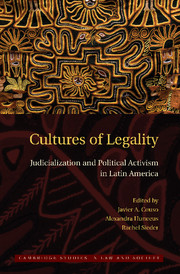Book contents
- Frontmatter
- Contents
- Contributors
- PART I INTRODUCTION
- PART II COURTS AND JUDICIALIZATION THROUGH A CULTURAL LENS
- PART III JUDICIALIZATION BEYOND THE COURTS
- 6 The Transformation of Constitutional Discourse and the Judicialization of Politics in Latin America
- 7 Legal Cultures in the (Un)Rule of Law: Indigenous Rights and Juridification in Guatemala
- 8 Political Activism and the Practice of Law in Venezuela
- 9 The Mapuche People's Battle for Indigenous Land: Litigation as a Strategy to Defend Indigenous Land Rights
- 10 Judicialization in Argentina: Legal Culture or Opportunities and Support Structures?
- 11 Novel Appropriations of the Law in the Pursuit of Political and Social Change in Latin America
- Index
- CAMBRIDGE STUDIES IN LAW AND SOCIETY
- References
6 - The Transformation of Constitutional Discourse and the Judicialization of Politics in Latin America
Published online by Cambridge University Press: 20 May 2010
- Frontmatter
- Contents
- Contributors
- PART I INTRODUCTION
- PART II COURTS AND JUDICIALIZATION THROUGH A CULTURAL LENS
- PART III JUDICIALIZATION BEYOND THE COURTS
- 6 The Transformation of Constitutional Discourse and the Judicialization of Politics in Latin America
- 7 Legal Cultures in the (Un)Rule of Law: Indigenous Rights and Juridification in Guatemala
- 8 Political Activism and the Practice of Law in Venezuela
- 9 The Mapuche People's Battle for Indigenous Land: Litigation as a Strategy to Defend Indigenous Land Rights
- 10 Judicialization in Argentina: Legal Culture or Opportunities and Support Structures?
- 11 Novel Appropriations of the Law in the Pursuit of Political and Social Change in Latin America
- Index
- CAMBRIDGE STUDIES IN LAW AND SOCIETY
- References
Summary
INTRODUCTION
Implicit in the assertion of a connection between legal culture and the judicialization of politics in Latin America is the notion that both concepts relate to relevant practices in this area of the world. As it turns out, however, neither is uncontroversial. Some scholars do not recognize the notion of legal culture as a meaningful or useful category, because they reduce social reality to rationally motivated individual actors operating under the constraint of different structures. Others dismiss the idea of a judicialization of politics in Latin America as unsuitable to the region.
Building on the growing body of literature that has documented the emergence of judicialization of politics in Latin America (Ríos-Figueroa and Taylor 2006; Taylor 2006; Sieder et al. 2005; Gloppen et al. 2004; Domingo 2004; Smulovitz 2002; Helmke 2005), this chapter takes legal culture to be a useful analytical category to make sense of the behavior of judges, lawyers, and even society at large. It then proceeds to explore the connection between judicialization and legal culture in the region. Furthermore, it suggests that in addition to structural factors such as the introduction of constitutional courts, the grant of judicial review powers to high courts, or the emergence of support structures, important changes in the internal legal culture of the region have been crucial for the emergence of judicialization of politics in Latin America. Specifically, the chapter traces the role that legal scholarship – in particular, constitutional theory – has played in transforming the region's legal culture.
- Type
- Chapter
- Information
- Cultures of LegalityJudicialization and Political Activism in Latin America, pp. 141 - 160Publisher: Cambridge University PressPrint publication year: 2010
References
- 23
- Cited by



